Dear Healthy Jew,
One of the first things we ask a new acquaintance is, “So what do you do?”
If they reply “nothing,” that’s weird. Everyone must do something.
Why? Because we are always going somewhere. Life is a journey, as we’ve always been told. At any given moment, we’re traveling toward a destination that lies beyond us, one step at a time, one minute at a time.
Here and There
This life-splitting dichotomy - the here going there - is the core of purposeful, spiritual living. In creating our world, God hung a barrier that separates earth from heaven, initiating the voyage that’s separated from its destination. Work was detached from reward, processes from their results.
Yet the two realms are never completely alien to each other. They can’t be. Without a destination, there won’t be a journey, because we wouldn’t be going anywhere. No less importantly, without a journey, there can’t be a destination, because the endgame’s essence is the natural outcome of the work, efforts, and process of life. While we trudge along the path, the destination shines on us from afar, lending purpose to our struggles, failures, and successes.
Torah sages and scholars never miss a chance to reiterate and refine this critical concept. For example, the Mishnah taught (Avos 4:16):
Rabbi Yaakov said, this world is akin to a corridor leading to the next world. While in the corridor, prepare yourself to enter the palace [or chamber].
To which Maimonides commented:
In this world, a person acquires the virtues with which he’ll merit the life of the next world. This world, indeed, is the path and transition to that world.
In another pithy statement, the Talmud (Eruvin 22a) taught about the Torah’s commandments:
“I [God] am commanding to you today to do them” (Deuteronomy 7:11). Today to do them, but not tomorrow to do them. Today to do them, tomorrow to receive their reward.
Notice the oneness peering out from the divergence. Life is always about the palace: the long corridor before entering is what makes the palace special, and the palace’s splendor is the purpose of the journey to earn entry. And God always relates to us through the same them: here they take the form of God’s manual for good living; the next world recasts them as the unsurpassable pleasure of eternally knowing God.
Holiness
Whenever some light from there shines on us here, we call it holiness, spirituality, transcendence, or whatever word you call a taste of existence beyond words. This light doesn’t come to deliver a temporary high, or even true tranquillity and happiness, but to give the undeniable and lasting sense that there is a purpose here, that reality is more than everything we can ever see, hear, smell, touch, and taste. As my teacher used to put it, holiness is the experience of reward in the form of work, the result within the process, the destination inside the journey.
Everything Judaism labels holy carries a message from there that guides life here, ensuring we remain firmly focused on the path ahead. The Torah is holy because it’s the Creator’s map of this world that portrays how it leads to the next. Shabbos, the Jewish day of rest, is also holy, because it offers a taste of reward through the work of fulfilling its numerous commandments.
Therefore, the heart of living in holiness isn’t straining the intellect to understand the exact nature of eternal oneness with God (and why you’d even want that), certainly not imagining flying with angels above the clouds. That would be vainly trying to live there. True holiness implies living here on the path to a there that isn’t here but imbues here with direction, purpose, and joy. In choosing that reality doesn’t begin and end inside my own little world, my own little world becomes infinitely larger.
We’re Not There Yet!
Wellness and goodness stem from knowing the destination – coupled with understanding that I’m not there yet. I’m heading the right way when I’m at peace with being en route – even if the process is painful, its exact meaning obscured.
Disturbances and wrongs, on the other hand, are rooted in the following fantasy:
Since the point of life is the destination, let’s just be there now!
By folding the destination into the journey, the next into the this, the journey loses its meaning and work its value. Life descends into a mindless chase after empty enjoyments because cheap knockoffs have displaced the wholeness that lies beyond, a wholeness that gets farther away each day the erstwhile traveler rests and revels.
If I buy into this narrative, instead of dwelling in the process, I’m always seeking to escape it. Effort and discomfort become unbearably painful. Instead of traveling through life toward a Creator that knows no limits, I’ve grabbed my small portion of the journey and crowned it king over all. Then, when you or the next fellow do the same, I get angry and jealous, and we fight. Families feud and armies battle over the right to imagine that this world is their own to keep.
The Journey of Life
Yet even if we value life’s voyage, it’s hard to dwell inside work and effort. Nobody naturally seeks to leave their comfort zone. And our instincts and egos are constantly bombarded with invitations to “escape,” that is to live in the fantasy that it’s possible and worthwhile to find wellness without purpose, to forget the path ahead and jump straight to endless pleasure.
One silly approach would be to start walking - literally - and never stop until arriving at the grave and falling inside. That would be living life as a journey, right?
Of course not.
Obviously, the primary meaning of “life as a journey” is a paradigm: earth is a corridor to heaven, the body to the spirit, and man to God. More specifically, throughout Scripture (particularly in Proverbs), “ways” refer to personality traits, and “walking” to how they are expressed in action (as clarified by Maimonides). The inner journey happens in our minds, hearts, and characters.1
Nevertheless, for this metaphor to carry any meaning, it must be grounded in the reality of our material world. Without regularly experiencing the simple definition of a word, its abstractions and archetypes are but empty shells, because our bodies inform our minds, not the other way around.
We can’t honestly talk of spiritual journeys if we have no idea how to embark upon a physical one. Firstly, we won’t really know what we’re talking about. Even more directly, the genuine spiritual journey itself begins with purposeful and healthful walking, because caring for our bodies is where all good choices begin. How can an incorrigible Talker rhapsodize about becoming a Walker?
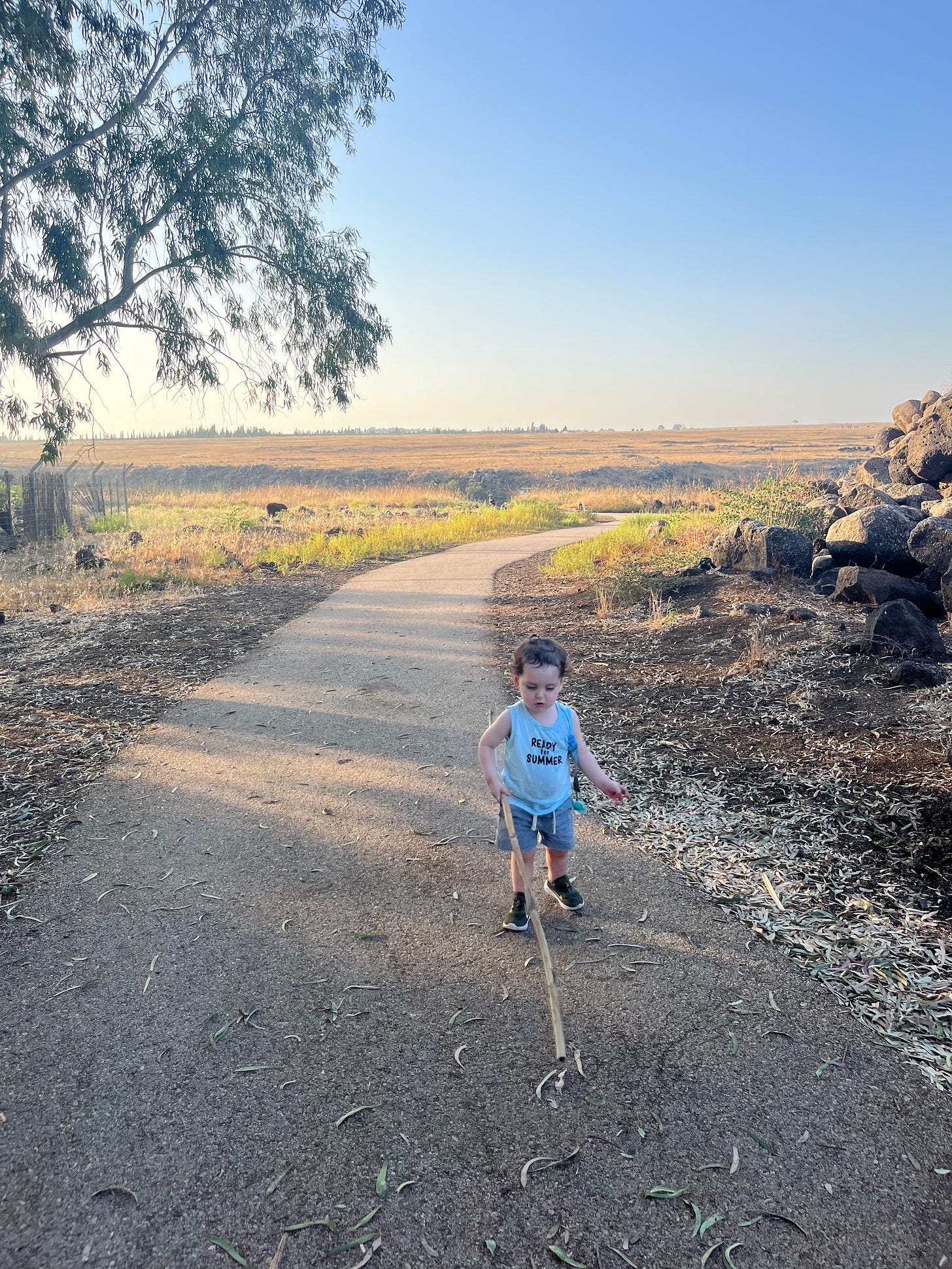
The Danger of Driving
In many ways, modern technology complicates living in the journey by presenting us with numerous readymade destinations. We’re endlessly tempted by distractions and pleasures of historically unprecedented intensity, availability, and variety.
But the challenge starts with something far more basic. Long before we’re tempted and distracted away from journeys through life, our psyches and spirits have forgotten the most basic meanings of the words journey, paths and walking: the effortful movement of our bodies from here to there.
Back in the day, people used to walk from one place to another, using their feet to propel them through the world. At best, they bumped along on a horse, maybe even the carriage it pulled. But today we strap ourselves inside speeding boxes that do the journeying for us. If that won’t do the trick, hundreds of us will squish together in tubes hurtling through the sky.
Whatever the details, instead of experiencing the process of travel through purposeful exertion, we delegate the job to our marvelous proxies while we distract ourselves with music, podcasts, and movies. We’ve lost the literal trudging down a path, one step at a time, one minute at a time.
If this were the entire dilemma, the solution would be simple: whenever possible, walk. Walk to go places; walk only for the sake of walking. Walk as if your life depends on it, because it does.
But our troubles go much deeper. In recent decades, navigation apps such as Waze and Google Maps have stolen one of the journey’s last tangible vestiges: the simple awareness that we’re going from here to there.
Learn how to reclaim your life’s journey here:
Before you go, how about dropping a comment on how you experience life as a journey - not only as an abstract metaphor, but for real, on purpose.
Thank you for reading Healthy Jew.
Here are 2 great paths to continue the journey:
Also check out this intro and index to explore hundreds of posts about our 3 Healthy Jew topics: Wellness with Wisdom, Land of Life (Israel), and Sensible Spirituality.
Finally, always feel free to reach out here with any comments, questions, or complaints:
I look forward to hearing from you!
Be well,
Rabbi Shmuel Chaim Naiman
Because life is a walking experience, Maimonides consistently calls character traits derachim, meaning “ways” or “paths,” and the way a person acts on them as “halicha,” meaning walking or going by said paths. (See, especially his Introduction to Avos and Laws of Character Traits where he writes at length about “good ways” and “straight paths,” as well as “paths which aren’t good.”) Maimonides didn’t invent the metaphor, but learned it from the Torah, particularly from the fundamental commandment to “go in His ways” (Deuteronomy 28:9). (This verse instructs us to balance all personality traits in the center, avoiding their extreme expressions, as I explained here.)
Perhaps to emphasize this point, Maimonides concluded the first chapter of his Laws of Character Traits by explaining how the middle path is called “the path of Hashem,” referring to what Abraham taught his descendants, “and they will observe the way of Hashem to do charity and justice” (Genesis 18:19). His second chapter concludes with King Solomon’s advice, “All your paths should be aligned [in the center] (Proverbs 4:26). Yet again, he summed up the third chapter with another one of Solomon’s aphorisms, “In all of your ways you should know Him, and He will straighten your paths” (Proverbs 3:6).
Maimonides also write in his Guide to the Perplexed (1:23): “halicha was also borrowed to refer to behaving with upstanding manners, even without moving the body at all.” This implies that the term refers particularly to positive traits, which fits well with what we learned today that goodness is rooted in the journey from here to there, and character defects stem from not journeying at all.
(Even though Maimonides also wrote of “paths that aren’t good,” the intention can be paths that aren’t truly paths. As my teacher, of blessed memory, would often explain, the Hebrew terms for “bad” and “evil” share the same root at “incomplete” or “unstable.” So when we speak of “bad paths,” we mean paths that aren’t genuine journeys. See also the Gaon of Vilna on Proverbs 15:24.)

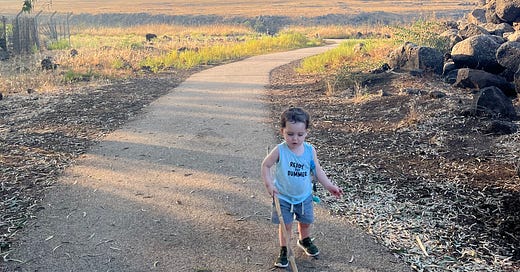



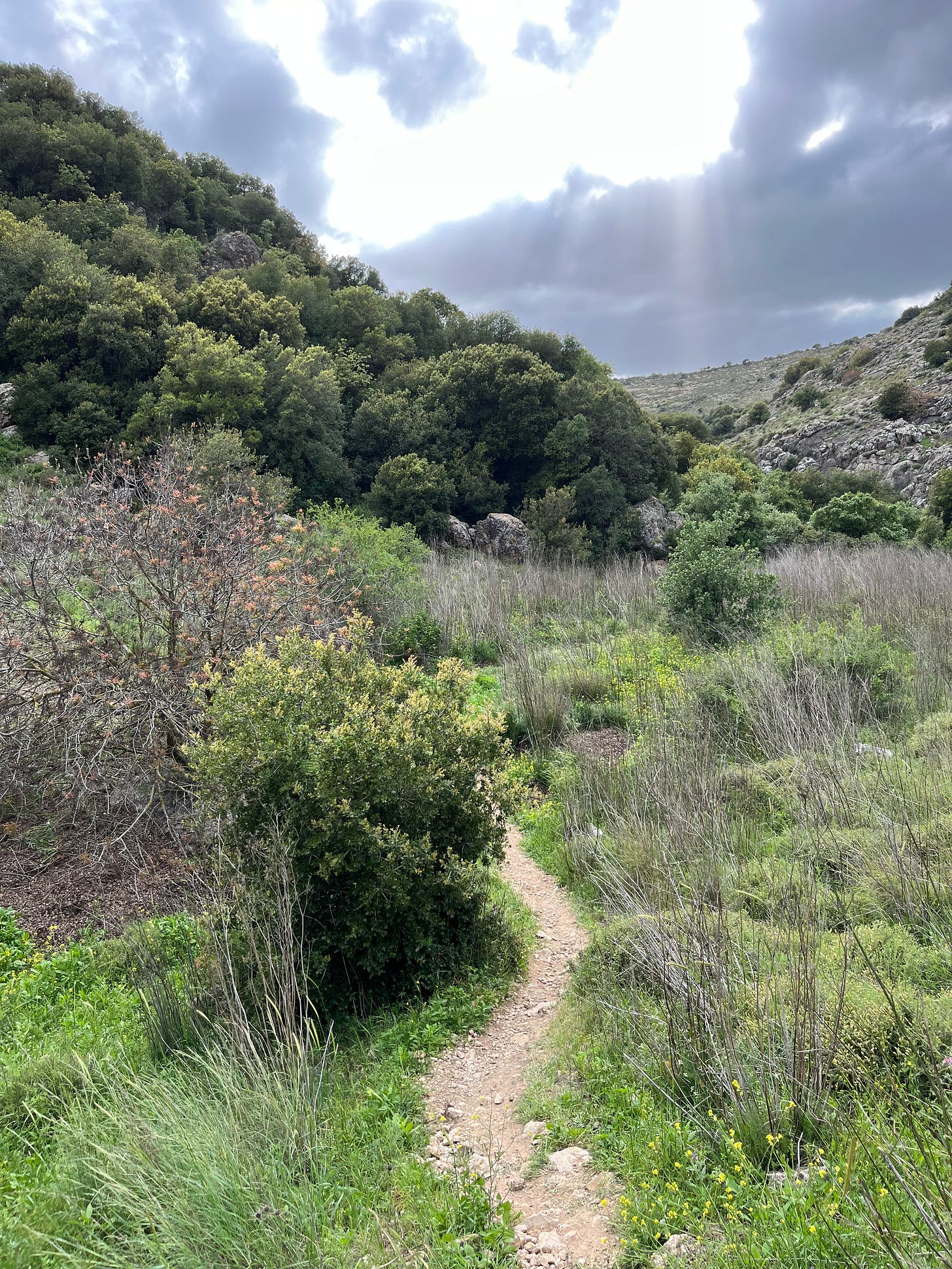
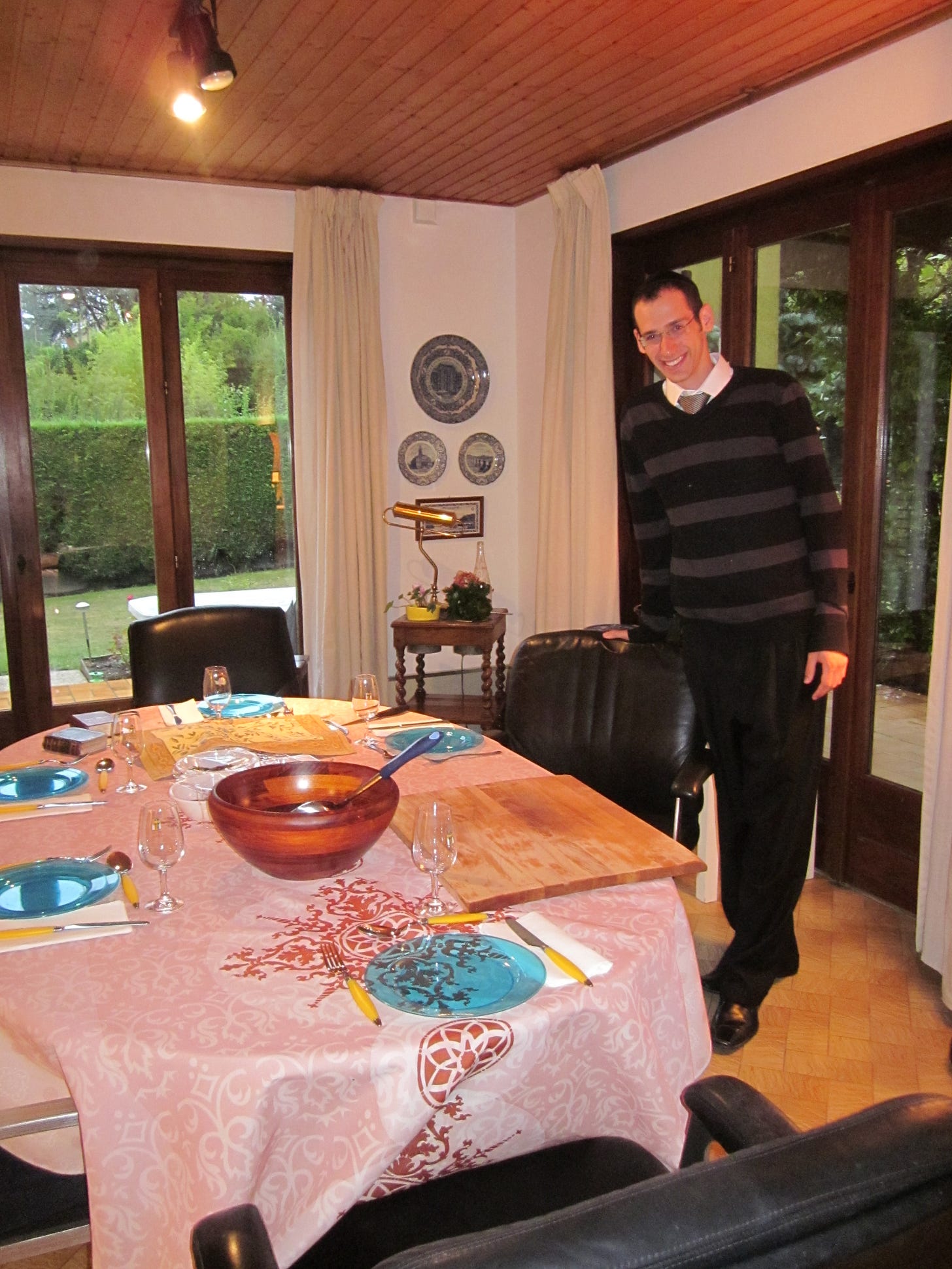
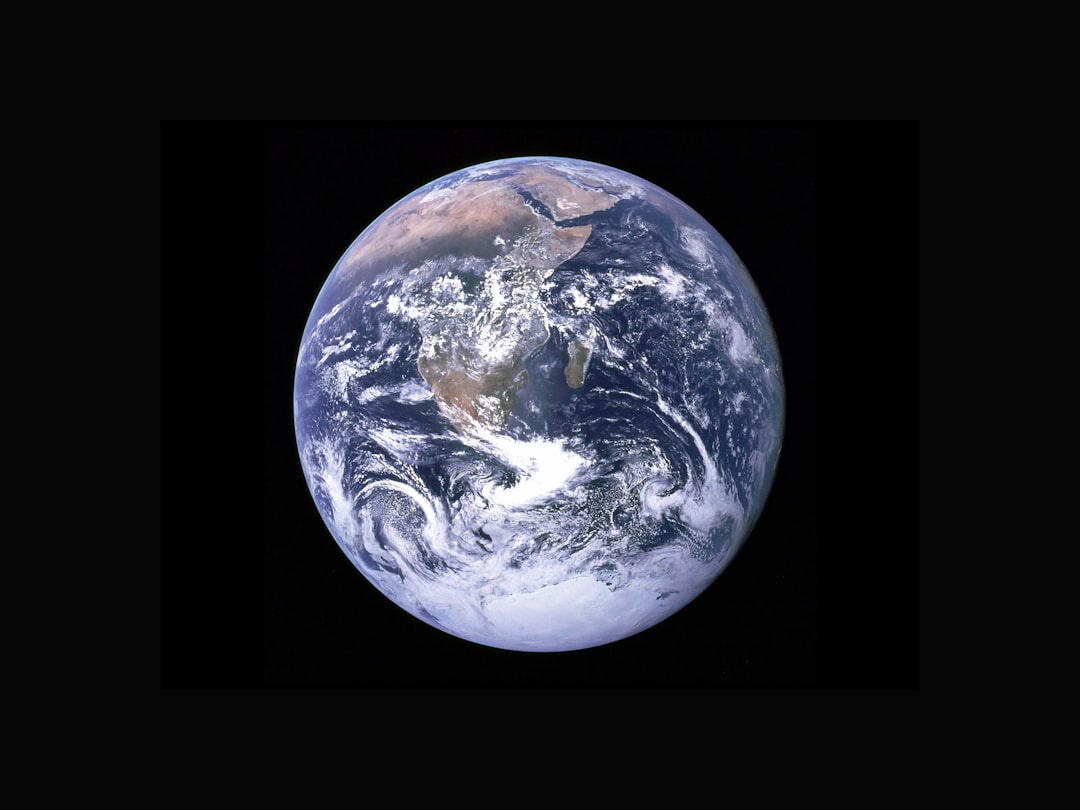


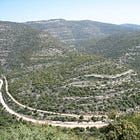




Wow, this was a delightful read, thank you so much for your insights and wisdom. I have never heard it from this perspective before and I deeply appreciate it.
I have always felt a call towards God/Great Spirit. Growing up I went to a Catholic school so resented "religion" and how it was taught then I discovered "spirituality" yet something just felt missing for me. The teachings were always about ascending or being with God and completely dismissed this incredible physical experience we are currently having.
For me now, Im currently at a place in my journey where I believe one of the Holiest things you can do is live life, to truly and deeply feel all of life/this journey and know that God/Great Spirit is also walking with you (to put it very simply) and that we have eternity to be with God head so let's enjoy and explore this journey of the "physical" while we can 💖
Almost convinced me to go for a walk. Sneaky! Seriously though, very thoughtful and relevant post.